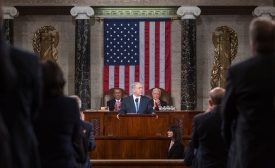nuclear talks

The ten most notable PD moments from 2015.

Reprinted from the CPD Blog by Sohaela Amiri (Mar 11, 2015)
Prime Minister Benjamin Netanyahu met with a six-member bipartisan US Congressional delegation on Monday, including Rep. Karen Bass (D-California) who was among 58 members of Congress who skipped his controversial speech to Congress in March. One government official said that while the speech in Congress did come up during the meeting, the main focus was on the Iranian nuclear negotiations. Netanyahu is continuing to be outspoken in his opposition to the Iran deal
The United States has been privately leaning on France and other allies to hold off on pushing a measure at the U.N. Security Council that is designed to force movement on the stalled Israeli-Palestinian peace process at least until negotiations over Iran’s nuclear program have concluded, diplomats told Foreign Policy.
With the United States and Iran currently negotiating a nuclear deal under which those sanctions would eventually be lifted, some American companies are now hoping for new business opportunities in a country that has long been off limits.
Although the Saudis like to emphasize their independence from U.S. policy, Western analysts say their actions thus far have not seriously challenged Western strategic interests in the region. The airstrikes in Yemen, for example, have not jeopardized the multinational nuclear talks.
Last week’s unanimous vote by the Senate Foreign Relations Committee on legislation allowing congressional oversight of a potential nuclear deal with Iran has been interpreted by some as a setback to President Obama. The opposite is the case. The fact is that the president’s patient and intricate diplomatic approach, along with other major world powers, to negotiating this historic agreement has gained real traction and it now seems highly unlikely that opponents of the deal could sabotage it through congressional action.
After triumphs abroad, President Barack Obama is finding stern challenges at home to his foreign policy breakthroughs, facing hard sells to skeptics over U.S. shifts, first on Iran and now Cuba. Obama returned to Washington early Sunday still basking in the attention from his historic meeting with Cuban President Raul Castro at a summit of Western Hemisphere leaders. But Obama is certain to find a lessappreciative crowd in Congress than the one he left behind at the Summit of the Americas in Panama.







